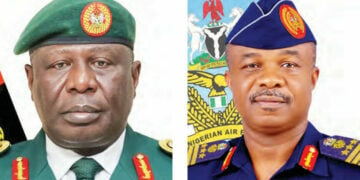The National Security Adviser (NSA) Mallam Nuhu Ribadu said hunger and poverty were the catalysts fueling insecurity across the country.
Ribadu spoke yesterday at the National Security Seminar with the theme “Combating Hunger and Poverty for Sustainable Peace and Development in Nigeria,” organised by the Alumni Association of the National Defence College (AANDEC) in Abuja.
The NSA represented by the director Defence Affairs Office of the National Security Adviser (ONSA) Major General Peter Mala said the theme of the seminar touches at the very heart of Nigeria’s national challenges.
He said, ” Hunger and poverty are not merely social concerns; they are catalysts for insecurity, crime, violence, and social disintegration. These issues form a vicious cycle — poverty leads to insecurity, and insecurity, in turn, deepens poverty.”
He said to provide a permanent solution, the leadership of President Bola Ahmed Tinubu, has prioritized agricultural reforms, social investment programmes, and security sector interventions aimed at breaking this cycle.
“These efforts are visible through increased support for food security initiatives, enhanced law enforcement capacity, and infrastructure to support agricultural production and distribution,” he added.
Ribadu said the Office of the National Security Adviser (ONSA), has continued to coordinate both kinetic and non-kinetic efforts across the armed forces, intelligence services, security agencies, and relevant government and non-governmental actors.
“Despite the progress made, issues like unemployment, hunger, and youth disenfranchisement remain persistent and require deeper, long-term solutions,”.
He reiterated that the current challenges were dynamic and multifaceted requiring “coordinated, inclusive, innovative, and forward-thinking” responses.
The Chief of Defence Staff (CDS), Gen. Christopher Musa, also reiterated that hunger and poverty were no longer mere social challenges but have become national security threats.
The CDS, represented by the Chief of Defence Training, Rear Adm, Ibrahim Shetimma, called for a unified national approach to combating hunger and poverty, stressing their growing impact on Nigeria’s internal security.
He commended the organisers for creating a strategic platform for critical dialogue on Nigeria’s security and developmental challenges.
He said, “Insecurity today is not only defined by weapons but also by economic deprivation, food insecurity, and social dislocation.
“Hunger and poverty are no longer mere social challenges – they have become national security threats.
“The North Central region, particularly Benue State once considered Nigeria’s food basket is a clear example of how banditry, displacement, and farmer-herder conflicts have devastated agricultural productivity.’’
Musa noted that the disruption of farming communities and illegal occupation of farmlands contributed to food inflation, displacement, and mass migration, thereby destabilising both the economy and national cohesion.
He called on communities to deny criminals and terrorists sanctuary by supporting intelligence gathering, timely reporting, and community vigilance.
The CDS called for urgent investment in grassroots agricultural development.
He urged government and stakeholders to reposition farming as a noble and rewarding profession by enhancing access to credit, infrastructure, and market linkages.
“With the migration of rural youth to urban centres, agricultural productivity is declining,” he warned.
“We must make farming attractive again—not as a last resort, but as a national duty and a prestigious calling,’’ he added.
Musa also praised President Bola Tinubu’s Renewed Hope Agenda, particularly its emphasis on financial autonomy for local governments, which he described as vital for responsive and community-driven development.
“I assure you, the Armed Forces of Nigeria, in synergy with other security agencies and with the support of the people, remain resolute in overcoming all security threats,” he said.
“We must build a Nigeria where every citizen can live in peace, engage in productive livelihood, and enjoy the dividends of democracy,” he concluded.
The minister of Defence, Alhaji Muhammed Badaru, in his remarks advocated human-centred security approaches by addressing the root causes of insecurity, including unemployment, poverty, and social exclusion.
The minister pointed out that in a world where security challenges knows no borders; there was need for collective action in addressing the nation’s security concerns.
He called for a “whole-of-society” approach to tackle pressing issues like hunger, poverty, and violence.
He commended President Bola Tinubu’s commitment to improving the quality of life for all Nigerians and praised the Armed Forces and security agencies for their bravery and innovation in responding to security threats.
According to him, the seminar served as a platform for stakeholders to deliberate on sustainable solutions, foster dialogue, and promote inclusive approaches to national security.
The minister expressed his confidence in the collective efforts of Nigerians to build a secure and prosperous future, where peace and stability reign supreme.
“May our collective efforts continue to strengthen our path towards unity, resilience, and sustainable national security,” he said.
In his remarks, the president of AANDEC, Air Commodore Darlington Abdullahi (Rtd), underscored the need for sustained investment in education, economic empowerment, and social inclusion as critical non-kinetic responses to Nigeria’s deepening security challenges.
Abdullahi said that hunger and poverty were not just humanitarian crises but strategic threats to national stability.
He quoted the timeless wisdom that says “the children of the poor you fail to train will never let your children have peace,” stressing that neglecting the socio-economic wellbeing of the population creates fertile ground for instability and extremism.
He said, “When millions suffer from hunger and poverty, they become vulnerable to exploitation by those with ill intentions.
“We must therefore invest in our people—especially in education, livelihoods, and skills development.”
“Economic initiatives that foster inclusion and bring communities together can be effective tools for peacebuilding,” he stated.
“They create an atmosphere of stability and discourage violence,” he said.
The AANDEC president praised the members of the association—retired military officers and senior public servants—as patriots committed to safeguarding Nigeria’s peace and unity beyond the battlefield.
He advocated for the creation of a dedicated vocational and leadership development centre for widows and children of fallen heroes, describing it as a necessary step in empowering vulnerable populations and promoting national healing.





